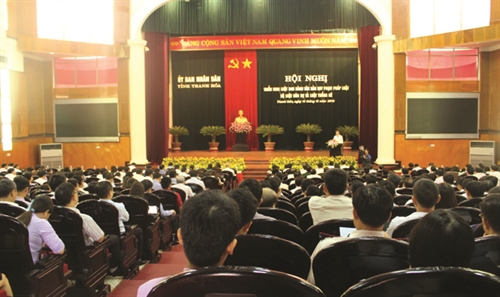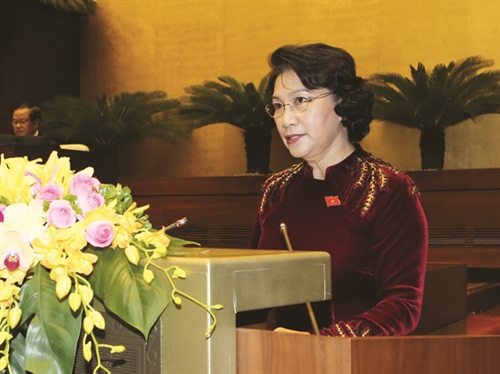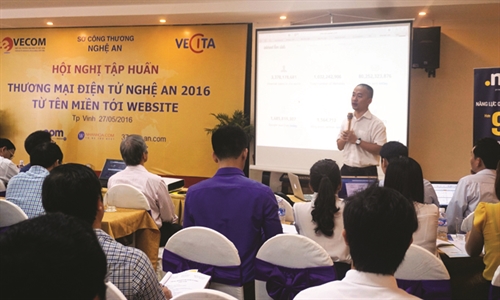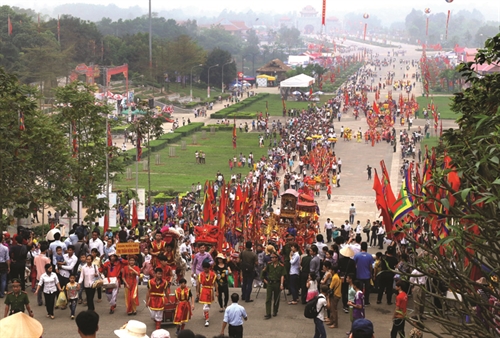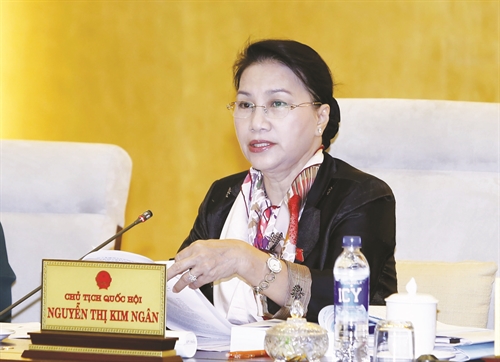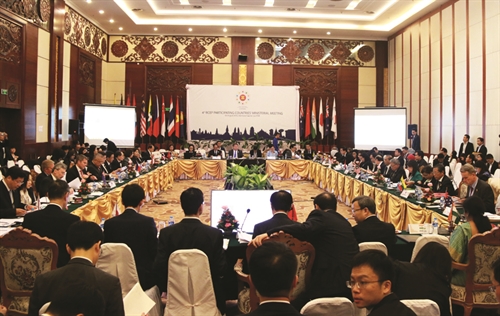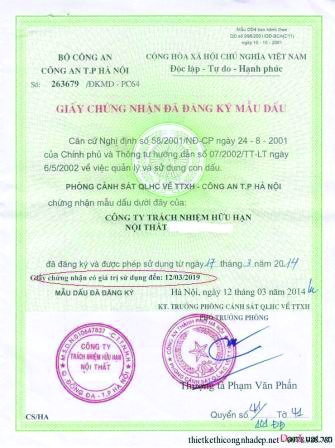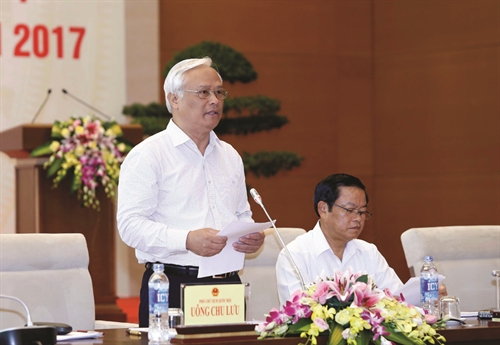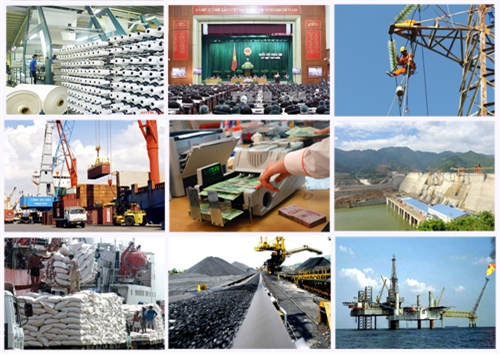The 14th National Assembly (NA) adopted a resolution on grant of e-visas on a pilot basis for foreigners entering Vietnam during its second session that concluded in Hanoi on November 23.
Under the resolution, e-visas will be granted to foreigners who live overseas and wish to enter Vietnam. The grant will be made on a pilot basis for two years, starting from February 1, 2017, and an e-visa will be valid for single entry for a period not exceeding 30 days.
The pilot grant of e-visas will apply to citizens of countries that have diplomatic ties with Vietnam or when the grant complies with Vietnam’s socio-economic development and external relation policies in each period and does not harm national defense, security and social order and safety of the country.
The resolution assigns the Government to decide on a list of countries whose citizens will be eligible for e-visas on a pilot basis and a list of border gates where foreigners will be able to enter Vietnam with e-visas.
According to the resolution, to be granted an e-visa, a foreigner must possess a passport and does not fall into the cases not permitted for entry under Article 21 of the Law on Entry, Exit, Transit and Residence of Foreigners in Vietnam. After entering Vietnam, if the foreigner applies for a new visa, the immigration agency will consider and grant a visa under this Law.
Applicants for e-visas will have to pay a charge via their bank accounts and this charge will not be refunded in case the visa grant is rejected.
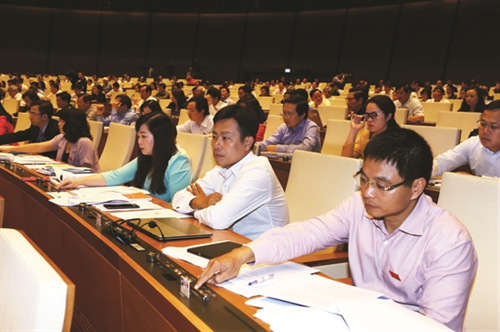 |
| NA deputies press buttons to adopt a resolution on pilot grant of e-visas for foreigners __Photo: Nguyen Dan/VNA |
The Government is also assigned to determine the order and procedures for grant of e-visas for foreigners entering Vietnam and report the implementation result to the National Assembly at its year-end session in 2018.
Foreigners who apply for conventional visas (other than e-visas) must comply with the Law on Entry, Exit, Transit and Residence of Foreigners in Vietnam and relevant treaties of which Vietnam is a member, the resolution says.
During the month-long session, the lawmakers also voted for the Law revising Article 6 and Appendix 4 on the List of 243 conditional business investment lines to the 2014 Law on Investment. They also passed the Law on Property Auction, the Law on Belief and Religion, and 11 resolutions including those on economic restructuring, state budget, and cessation of the project to build Ninh Thuan nuclear power plants.
With 81 articles, the Law on Property Auction regulates the principles, order and procedures for property auction; auctioneers and auction organizers; auction charges and fees; handling of violations, cancellation of auction results, and compensation; and state management of property auction.
The law will come into force on July 1, 2017, except Clause 4 of Article 80 which will take effect on January 1, 2017. This clause allows auction organizers to collect auction service charges under current regulations until the law becomes effective.
According to the Resolution on allocation of state budget funds in 2017, the total central budget revenue is estimated at over VND 729.7 trillion (USD 32.7 billion) while the total local budget revenue is set at VND 482.4 trillion (USD 21.6 billion).
Total budget expenditures will be over VND 902 trillion (USD 40.4 billion), of which an estimated amount of VND 254.6 trillion (USD 11.4 billion) will be allocated to local budgets.
The NA asked the Government to assign the budget collection and spending tasks to each ministry, sector and locality in line with the Law on the State Budget and the resolution.
The Government must guide ministries, sectors and localities to distribute development investment capital with priority given to major national programs and projects, and official development assistance and public-private partnership projects.
The NA Standing Committee, the NA’s Finance-Budget Committee and the NA’s Ethnic Council are responsible for supervising the allocation of state budget funds for ministries, sectors and local People’s Committees and People’s Councils.
Legislators also approved the Resolution on the five-year financial plan, targeting the total state budget revenue for 2016-20 at about VND 6.86 quadrillion (USD 308.7 billion), representing a 1.65 fold increase against the 2011-15 period, with domestic revenue expected to account for 84-85 percent of the total state budget collection.
Accumulated state budget expenditures in the coming five years are set at more than VND 8.02 quadrillion (USD 361 billion), of which development expenditures make up 25-26 percent and regular expenditures, below 64 percent.
Combined development expenditures in the period will be no more than VND 2 quadrillion (USD 90 billion). Of the figure, expenditures sourced from government bonds will be VND 260 trillion (USD 11.7 billion), including VND 60 trillion (USD 2.7 billion) left from 2014-16.
Budget overspending in the next five years is capped at 3.9 percent of GDP. Of the figure, the ceiling of central budget overspending is 3.7 percent and local budget overspending, 0.2 percent.
With these measures, budget overspending is expected to drop to 3.5 percent or less of GDP by 2020, in an effort to balance the state budget and keep public debts within limit.
The resolution also aims to ensure the safety of public debts, which will be kept at no more than 65 percent of GDP annually. Government debts will not exceed 54 percent of GDP and foreign debts, no more than 50 percent.
The Government will allocate no more than 25 percent of the annual total budget revenue for debt payment.
As per the resolution, state budget collection policy will be revised toward raising GDP mobilization to the state budget, higher domestic collection and decreasing income from crude oil, natural resources and imports and exports.
About 20 percent of the total budget expenditure is expected to be spent on education and 2 percent, on science and technology.
Basic salary, pensions, and allowances for people with meritorious contributions to the nation will increase by about 7 percent annually.
State budget overspending will be cut and public debts restructured toward decreasing foreign debts and increasing local debts. A bond market will be established to limit international bonds and promote five-year government bonds.
To achieve these goals, the resolution stresses the task of completing financial institutions and national financial mechanisms. The management of state budget revenues and expenditures will be restructured toward an outcome-oriented approach up to international standards.
Public spending will be restructured to support salary reform. The governance and performance of state enterprises will be improved. Public debt is also set to be managed within the safe limit, the resolution says.
According to the Resolution on the economic restructuring plan in the 2016-20 period, state budget overspending will be reduced to below 3.5 percent of GDP by 2020, while public debts, government debts and foreign debts will not exceed 65 percent, 54 percent and 50 percent, respectively, of GDP annually.
Existing non-performing loans in the national economy will be curbed to below 3 percent, while the capitalization of the stock market and the bond market will make up 70 percent and 30 percent of GDP, respectively. At least one million businesses will be set up by 2020, among other goals.
The resolution stresses the need to adhere to the Party’s guidelines and policies, especially the Resolution of the 12th Party Central Committee dated November 1, 2016, to build a growth model measured by labor productivity and the quality and competitiveness of the national economy, and to mobilize, allocate and use resources efficiently based on market signals and rules.
Internal resources should be fully tapped in combination with attracting and efficiently using external resources. Macro-economic stability must be maintained and economic growth must go along with social advancement, progress and justice, the safeguarding of defense, security and ecology, scientific and technological applications, human resource quality and workforce restructuring, the resolution stresses.
The implementation should keep abreast with the market life, and the development of the private sector should be regarded as an important driving force in economic development.
Economic restructuring should be coupled with reshuffling the administration, stepping up administrative reform, and improving the quality of public services.
Free trade agreements should be soundly implemented to make the best use of international integration and the fourth industrial revolution to ensure economic growth is well associated with environmental protection and climate change adaptation, the resolution emphasizes.
Key tasks include to restructure public investment, state enterprises and credit institutions; rearrange state budget and the public sector; and promote the development of the private sector and attracting foreign direct investment. It is also necessary to modernize the planning and structuring of sectors and economic zones with regard to increasing productivity, quality, and efficiency and speeding up international economic integration; and form and develop various markets, including the finance market, land use rights market, labor market and science and technology market in a uniform fashion.
The Resolution on the socio-economic development plan for 2017 targets a gross domestic product (GDP) growth rate of about 6.7 percent.
The plan also targets a 6-7 percent rise in export-import revenue, and trade deficit accounting for some 3.5 percent of the total trade turnover.
The consumer price index is set to increase around 4 percent, and total social development investment is expected to reach 31.5 percent of GDP.
Vietnam is set to have the rate of poor households declined by 1-1.5 percent. It is hoped that health insurance will cover 82.2 percent of the population next year.
The plan continues to target a stable macro-economy, economic restructuring associated with growth model reform, and higher competitiveness. It also looks to encourage sustainable startups, ensure social welfare, proactively respond to climate change, intensify environmental protection, and step up administrative reform.
Under the plan, the country will press on with protecting independence, sovereignty, territorial integrity, national security, political stability, and social order and safety.
It is also going to upgrade diplomatic activities, international integration, and promote a peaceful and stable environment for national development.
At this session, the NA also approved a resolution on questions and answers at the second session and another one on further raising the implementation efficiency of the national target program on building a new countryside associated with agriculture restructuring.
The lawmakers discussed draft laws concerning foreign trade management; supports for small- and medium-sized enterprises; planning; irrigation; guard force; and management and use of weapons, explosives and supporting tools. Others include draft revisions to the laws on railways; management and use of state property; technology transfer; tourism; legal aid; and state compensation liability.
The legislators decided not to pass the Law on Associations and the Law on amendments to the Penal Code at this session as scheduled, but will consider adopting them at the NA’s third session.- (VLLF)
